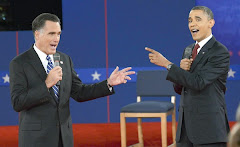President Barack Obama and Israeli Prime Minister Benjamin Netanyahu discussed Iran’s suspected atomic weapons program amid a rift between the two nations over how to confront the Iranian security threat.
The two leaders spoke by phone last night for an hour, the White House said. While providing no further details, the White House said in a statement Obama and Netanyahu “reaffirmed that they are united in their determination to prevent Iran from obtaining a nuclear weapon.”
Netanyahu declared earlier yesterday that the Obama administration has no “moral right” to keep Israel from attacking Iran as long as the U.S. doesn’t set “red lines” for Iran. His remarks reflect differences within his government about an Israeli attack on Iran and a bid to pressure Obama less than two months before the U.S. election. The call came after Israeli media reports, denied by the White House, that Netanyahu’s request to meet Obama later this month was snubbed.
“Strategically it’s not in either of their interests to show the world they are not on the same page,” said Aaron David Miller, a former State Department official who served under Democratic and Republican presidents.
In addition to strategic concerns, there are political implications for both leaders. The dispute hurts Netanyahu’s efforts to convince divided Israelis of the merits of a strike, Miller said in an interview. For Obama, locked in a tight race with Republican challenger Mitt Romney who has been questioning Obama’s commitment to Israel, the differences may affect his appeal with voters in battleground states.
“In a close election you don’t want to alienate anyone,” said Miller, who’s now at the Woodrow Wilson International Center for Scholars, a Washington policy group.
Avoid Attack
Obama’s objective between now and the election is to avoid an Israeli attack, Miller said, “because war introduces uncertainties” that may include a doubling or tripling of oil prices, turmoil in European and American markets and public division over a discretionary war.
Miller said his experience suggests last night’s call was a “let’s put things back in the box” discussion and not a breakthrough session.
Republican Senators John McCain of Arizona and Lindsey Graham of South Carolina expressed displeasure earlier yesterday with the White House’s disclosure that Obama doesn’t plan to meet Netanyahu later this month, when the Israeli leader visits New York for the annual United Nations General Assembly meeting.
“If these reports are true, the White House’s decision sends a troubling signal to our ally Israel about America’s commitment at this dangerous and challenging time, especially as Iran continues to work actively toward developing a nuclear weapons capability,” they said in a statement.
Century Fox reports: "Iran may strike U.S, if Israel attacks" says Hezbollah
No Meeting
White House National Security Council spokesman Tommy Vietor said yesterday that Obama and Netanyahu wouldn’t be in New York at the same time, and that “contrary to previous press reports, there was never any request for a meeting” between Netanyahu and Obama.
The newspaper Haaretz was among media outlets in Israel that reported earlier that the White House rejected a request by Netanyahu for a meeting.
Romney and his campaign refrained from any immediate reaction because Netanyahu’s comments coincided with the anniversary of the Sept. 11, 2001, terror attacks on New York and Washington, and the candidates had pledged to set aside partisanship for a day.
The Republican nominee made no mention of the U.S.-Israeli dispute in a speech to National Guard members in Reno, Nevada. That may change as soon as today.
‘All Measures’
During a July trip to Israel, Romney said it is “right” for the U.S. to stand with Israel and use “any and all measures” to stop Iran from developing atomic capabilities. Throughout the campaign, Romney has portrayed Obama as insufficiently supportive of Israel.
Opinion polls show the majority of Americans favor a cautious approach to Iran.
A survey by the Chicago Council on Global Affairs found 70 percent of Americans oppose a unilateral strike against Iran while 59 percent don’t want the U.S. involved in a potential war between Israel and Iran. The survey of 1,877 adults, conducted May 25-June 8, has a margin of error of plus or minus 2.8 percentage points.
While Iran is “an issue of concern” for voters, “I don’t think this is the focal point for most people,” said Dennis Ross, a former senior Middle East adviser to Obama and other U.S. presidents of both political parties.
“The people who don’t support the president will be quick to grab onto something like this,” Ross said. “Those who do will think his overall approach to this is still a sound one.”
Florida Factor
Netanyahu’s criticism is unlikely to be a determinative factor in the election because Jews aren’t single-issue voters, and most Jewish Democrats have supported Obama, Miller said.
Even so, he said, “In a close election, of course, anything can happen.”
Obama won in 2008 with 78 percent support from Jewish voters, according to a national exit poll, and he and his surrogates have said he has an unbreakable bond with Israel and a record of military and political support to prove it.
Florida is the biggest swing state with a large proportion of Jewish residents, and Obama held a 0.6 percentage point lead over Romney there, 47.3 percent to 46.7 percent, in an average of six polls conducted Aug. 13-Sept. 2 and compiled by the Real Clear Politics website.
Other battleground states where the Jewish vote may make a difference in a close race this year include Nevada, Ohio and Wisconsin.
‘Red Lines’
Netanyahu’s remarks came two days after Clinton said in a Bloomberg Radio interview that the U.S. is “not setting deadlines” on negotiations with Iran. State Department spokeswoman Victoria Nuland later said it is “not useful” to set deadlines or “red lines.”
What Netanyahu wants is assurance that the U.S. will commit its own military forces to destroy Iran’s nuclear program if economic sanctions and diplomacy don’t have the desired effect, Miller said.
Netanyahu’s aim is unrealistic, Miller said in a telephone interview yesterday, and it “diminishes Israel’s credibility and undermines its deterrent capacity.”
Netanyahu also is trying to build public support in his own country in case Israel decides it must strike, said Emily Landau, director of the arms control and regional security program at the Institute for National Security Studies at Tel Aviv University. He and Defense Minister Ehud Barak “seem increasingly isolated in their support for this option as more and more top security figures come out against it,” she said.
Domestic Support
“Netanyahu may have a plan to build more domestic political support for an Iran action, but whatever is hitting the media and becoming part of the public debate is building up a case against that,” she said.
Gabi Ashkenazi, a former Israeli military chief of staff, said Israel shouldn’t jeopardize its ties with Washington. “I strongly recommend that we preserve our strong relationship with the United States. Our strong bond is not only imperative to us from a security perspective but also economically,” Ashkenazi said at a conference in Tel Aviv yesterday.
Even Defense Minister Barak, one of the most hawkish members of the Israeli security cabinet, yesterday stressed the importance of maintaining Israel’s ties with the U.S.
“Despite these differences, and the importance of maintaining Israel’s independence-of-action, we must also remember the significance of our partnership with America and do everything possible not to harm this,” the Defense Ministry quoted Barak as saying in a private forum.
Political Motive
Ross, now at the Washington Institute for Near East Policy, stopped short of ascribing a U.S. political motive to Netanyahu’s remarks.
“If there wasn’t an election right now, I think he’d be saying the same thing,” Ross said.
Ross said Netanyahu is concerned that, if Israel waits too long, it will lose its own capability to strike. He is trying to “motivate the rest of the world to act more seriously against Iran,” an approach that led to sanctions that otherwise might not be in place, Ross said.
While the disagreement between the U.S. and Israel should be discussed, “it’s better that they happen behind closed doors,” Ross said. “What you want is the focus to remain on Iran.”
EXPLORE: World News UN Iran War Obama And Israel
Edited By Cen Fox Post Team



































